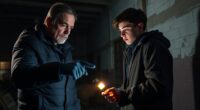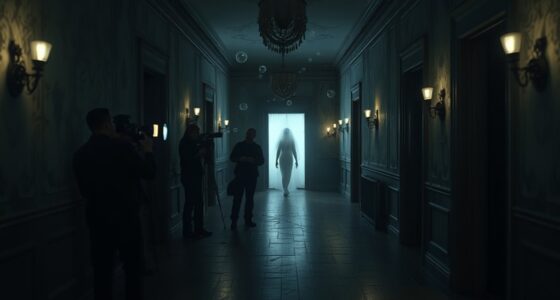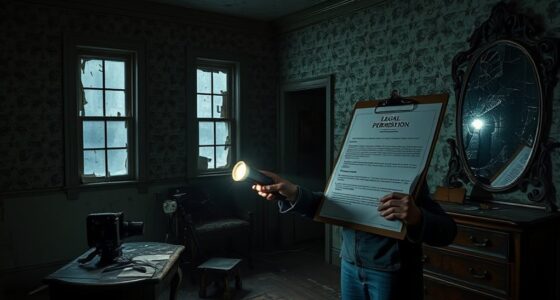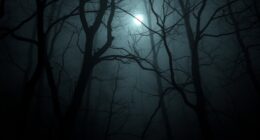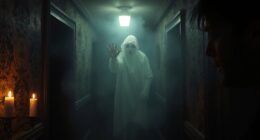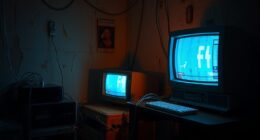Ghost hunting shows often distort reality to make things more exciting. They use camera tricks, editing, and staged effects to create suspense and drama, not proof of ghosts. You rarely see the behind-the-scenes methods or how scenes are choreographed for entertainment. These shows focus on entertaining you, not showing what really happens or proving paranormal activity. If you keep exploring, you’ll discover how much of what you see is manipulated for TV’s thrill.
Key Takeaways
- Ghost hunting shows often dramatize or stage scenes, ignoring the lack of verified evidence.
- They rely on editing, special effects, and camera tricks to create suspense rather than genuine paranormal activity.
- The shows focus on entertainment, often exaggerating or fabricating incidents to boost viewer engagement.
- Critical scientific methods and skepticism are rarely shown or emphasized in these productions.
- Behind the scenes, investigations typically involve mundane or inconclusive results, unlike the dramatic portrayals on TV.

In today’s world, the lines between reality and television often blur, making it hard to distinguish fact from fiction. Ghost hunting shows are prime examples of this, blending entertainment with elements of the supernatural. While they may seem to offer a glimpse into the paranormal, they often prioritize drama over accuracy. As a viewer, it’s easy to get caught up in the suspense, but it’s important to remember that much of what you see is shaped by television dramatization, not hard evidence. These shows are designed to entertain, not necessarily to inform or prove the existence of ghosts.
Many of these programs lean heavily on storytelling techniques that heighten tension and suspense, often at the expense of scientific rigor. This is where paranormal skepticism becomes essential. Approaching these shows with a critical eye helps you understand that what looks like clear evidence of a haunting is frequently the result of camera tricks, suggestive settings, or the influence of the show’s producers. The thrill of the chase can lead to overlooking the fact that many phenomena captured are ambiguous at best. You should question whether the “evidence” presented is genuine or simply a product of editing and storytelling. Recognizing the role of television dramatization can help you better evaluate the content you consume.
Question the evidence; much is edited, staged, or ambiguous rather than genuine paranormal activity.
Television dramatization plays a significant role in shaping perceptions of the paranormal. Filmmakers and producers craft scenes to evoke fear and curiosity, often exaggerating or fabricating incidents to keep viewers hooked. Shadows may be intentionally highlighted, strange noises amplified, and unexplained movements choreographed to create a sense of mystery. The goal isn’t necessarily to prove the existence of spirits but to entertain and keep viewers engaged. As a result, you may find yourself believing in paranormal activity based on incomplete or staged evidence, which doesn’t hold up under scrutiny. Additionally, understanding the use of special effects used in production can help you identify how scenes are manipulated for dramatic effect. Being aware of television production techniques can further enhance your critical perspective.
Understanding this distinction helps you approach ghost hunting shows more critically. Instead of accepting every claim at face value, you start to see how much of the footage is manipulated or sensationalized. The reality of ghost hunting involves a lot of patience, skepticism, and scientific inquiry—qualities rarely highlighted in these dramatized TV productions. Scientific inquiry is essential to differentiate between genuine phenomena and entertainment fabrication. Additionally, knowing about resources and tools, such as specialized equipment or legal considerations, can help ground investigations in reality rather than entertainment hype. While it’s tempting to believe in what you see, keeping a level head and questioning the evidence ensures you don’t fall victim to the entertainment hype. Ultimately, recognizing the difference between genuine investigation and television dramatization allows you to enjoy these shows without losing sight of the reality behind the supernatural claims.
Frequently Asked Questions
How Do Ghost Hunting Shows Select Their Locations?
When choosing haunted venues, producers consider location criteria like history, reputation, and stories of paranormal activity. You might find them researching local legends or consulting with paranormal experts to identify sites with rich histories. They often select locations that will captivate viewers and provide compelling evidence. Ultimately, they aim for venues that meet their criteria for paranormal potential, ensuring the show stays engaging and authentic for the audience.
What Safety Measures Are Typically Overlooked in TV Ghost Hunts?
You might think safety protocols are always followed during ghost hunts, but paranormal myths often lead crews to overlook vital precautions. Many shows neglect essential safety measures like proper equipment checks or having emergency plans, risking injury or false readings. Always prioritize clear safety procedures, including communication plans and protective gear, to guarantee a safe experience. Recognizing these overlooked safety measures helps you approach ghost hunts responsibly and reduce unnecessary risks.
Are There Any Scientific Explanations for Paranormal Phenomena?
You might wonder if there are scientific explanations for paranormal phenomena. While paranormal skepticism exists, some scientists conduct investigations to find logical causes, like environmental factors or psychological effects. Many supposed ghost sightings can be explained through natural causes or perception errors. Scientific investigations aim to analyze evidence objectively, but often, what seems paranormal has clear, scientific reasons behind it. Keep an open mind, but also consider rational explanations.
How Much of the Show Is Scripted or Staged?
You might wonder how much of these shows are staged or scripted. Producers often stage encounters to create excitement, fueling reality distortion that makes scenes seem more authentic than they are. While some moments are genuine, many are carefully planned or reenacted to enhance storytelling. So, keep in mind that what you see on screen isn’t always an accurate reflection of real ghost hunting, as staged encounters are common to boost viewer engagement.
What Equipment Is Often Misrepresented or Exaggerated on TV?
You might notice that paranormal equipment like EMF meters or spirit boxes often gets exaggerated on TV. Producers tend to overstate their capabilities or suggest they’re more reliable than they really are, leading to TV exaggeration. In reality, much of this equipment isn’t as definitive as shows make it seem. You should be cautious and understand that some of what you see on screen isn’t entirely accurate for actual ghost hunting.
Conclusion
So, next time you watch a ghost hunt unfold on TV, remember it’s more like a carefully scripted dance than a wild chase through haunted halls. Behind the polished shadows and dramatic screams, there’s a hidden stage where reality often takes a backseat. Like a magician’s trick, what you see is just the surface—true ghost stories are buried beneath, waiting quietly for those willing to look past the smoke and mirrors.

